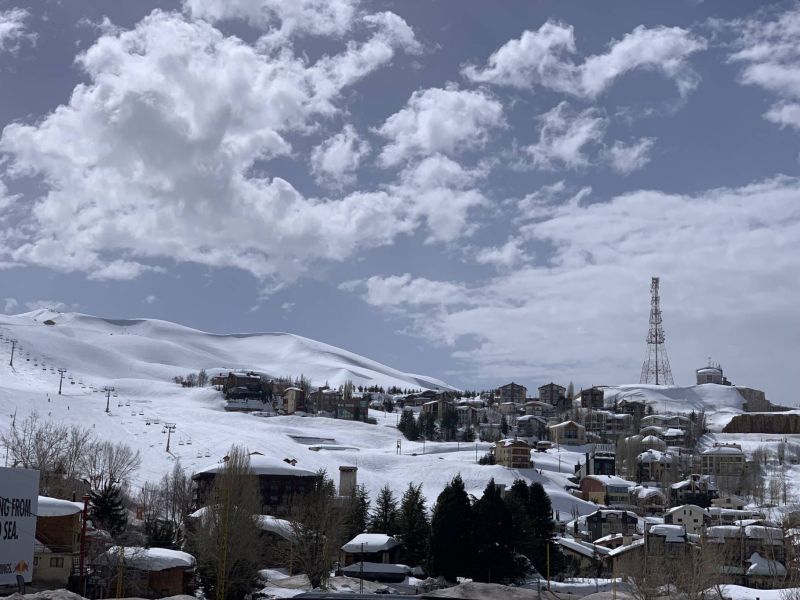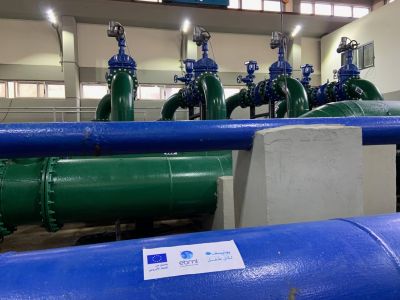
Snow recharges rivers, springs and groundwater to at least 70 percent, according to researcher Amine Shaban. (Credit: Mohammad Yassine/L'Orient-Le Jour)
Lebanon’s most recent winter was marked by decreased rainfall and snowfall compared to levels observed in 2022 and the 30-year average, prompting concerns about water scarcity.
Instances of wasteful water usage, such as car wash hoses left running continuously and excessive household cleaning, exacerbate the situation.
With some areas relying on costly private water tanks — and with drinking water taps already running dry — the summer and upcoming low-water period (September-October) pose significant challenges, and raise questions about the population’s access to sufficient water.
According to the weather service at Beirut International Airport, Beirut experienced a decrease in rainfall in 2023. Only 648.2 mm of rain has fallen so far, compared to 673.6 mm in 2022 and a thirty-year average of 823 mm.
Tripoli also saw reduced rainfall, with 726 mm in 2023 compared to 845.5 mm in 2022. The Bekaa region experienced even lower rainfall at 544.6 mm in 2023.
Snowfall data is not as readily available, but estimates suggest that it is slightly below the annual average of 2,540 square kilometers, according to Amin Shaban, director of research at the French National Centre for Scientific Research (CNRS).
1.5 billion cubic meters per year
Summer water scarcity is a common occurrence in Lebanon, often attributed to unpredictable weather patterns.
Despite the decrease in rainfall this year, water expert and adviser to the Energy and Water Ministry, Suzy Hoyek, assured that the available water quantities in Lebanon should be sufficient for the summer.
The overall water requirements for the country, which include household, industrial, agricultural, and tourist consumption, are supplied by various sources such as water boards, private cisterns, distributors, and artesian wells.
Hoyek acknowledged that the problem of water scarcity typically arises during the last two months of the dry season (September-October), as it does every year. In response to drinking water rationing, people often turn to alternative solutions such as water tankers and excessive use of pumping wells, even if it means obtaining water that may be salty or polluted due to contamination from sewage seepage into the water table.
Abdel Rahman Zawawy, head of the forecasting department at Beirut International Airport, highlighted the impact of less rain and delayed snowfall on the water supply.
With lighter snow coverage and anticipated water shortages, he expressed concern about the inevitable effects on urban areas, indicating that the water supply is likely to be affected during the summer.
The challenging geographical features of Lebanon, characterized by steep slopes and mountainous terrain, also contribute to water scarcity issues.
Rainwater flows rapidly toward the sea, preventing proper groundwater replenishment, according to Shaban, who clarified that the primary source of groundwater storage is snowmelt.
“While rainfall only contributes up to 30 percent of groundwater recharge, in some areas, it can be as low as 10 percent,” he said. “In contrast, snow plays a crucial role in recharging rivers, springs, and groundwater, accounting for at least 70 percent of the replenishment process.”
But these two factors alone do not provide a sufficient explanation for Lebanon’s recurring water shortages each summer.
“It is paradoxical for Lebanon, a country with abundant water resources exceeding 1,250 cubic meters per capita per year, to still face water stress,” said Shaban.
He attributes the situation to poor management of investments and resources, excessive pollution, population growth, and a lack of responsibility.
One notable issue is the rampant urbanization and high population density in certain areas of Lebanon, which prevents rainwater from effectively infiltrating the ground.
The need to implement measures to capture and utilize water resources before it flows into the sea is crucial.
Governance under fire
Poor governance plays a significant role in the water scarcity issue.
Nadim Farjalla, director of the environment and climate change program at the American University of Beirut’s Issam Fares Institute said Lebanon receives approximately 2.7 billion cubic meters of rainfall annually, which should be sufficient even with a 40 percent decrease in rainfall, provided that the water is effectively stored.
“Apart from the artificial lakes of Qaraoun, Chabrouh and Qayssamani, and bearing in mind that the Msaylha site is still under construction, Lebanon has no reservoirs for the water from rivers and springs,” said Farjallah.
“Small-scale dams are necessary to limit the impact on the environment,” he added, also stressing the importance of establishing large reservoirs within neighborhoods to address the water shortage challenge.
One of the major governance challenges is the prolonged power outages that have paralyzed water pumping since 2019, exacerbated by an unprecedented crisis and the devaluation of the Lebanese lira.
“Over the past two years, the situation has been exceptionally challenging. Due to the scarcity of fuel, it has been impossible to pump water and meet the population’s demand,” recalled Hoyek.
However, she insisted the situation would improve this summer with the implementation of a fuel agreement with Iraq.
Another difficulty lies in the significantly low water prices, which have not been adjusted according to foreign exchange rates despite the decline in the local currency.
“At present, the annual subscription fee is only around $40 dollars, whereas for the sector to operate effectively, it should be at least $100 dollars,” Hoyek added.
Combatting waste
Persistent issues such as illegal tapping into the water networks and compromised infrastructure, leading to leaks and wastage, continue to complicate the situation. These challenges become even more critical during periods of water scarcity.
According to Farjalla, between 30 percent and 50 percent of the water produced by the water boards is lost, stolen, or wasted. To address this issue, the researcher emphasized the need for a comprehensive drought management plan.
Implementing measures to conserve water is crucial, including imposing restrictions on activities like car washing, pavement cleaning, and watering streets during dry periods. Additionally, austerity measures targeting farmers and households could be implemented, accompanied by penalties and compensation for affected sectors.
“No significant [state] action has been taken to address water wastage thus far,” said Farjalla.
For his part, Zawawi explained that any effective government policy should focus on combating water wastage, managing rainwater conservation, and ensuring its quality.
According to Farjalla, addressing the water scarcity issue requires considering a diverse range of solutions. One such effort is the project initiated by the Energy and Water Ministry, supported by donors.
The project aims to reform the sector and is expected to encompass the entire country by 2028. Key aspects of the project include enhancing network infrastructure, implementing flow meters, expanding storage capacity, and adjusting tariffs, among other measures.
This article was originally published in French in L'Orient-Le Jour. Translation by Sahar Ghoussoub.

